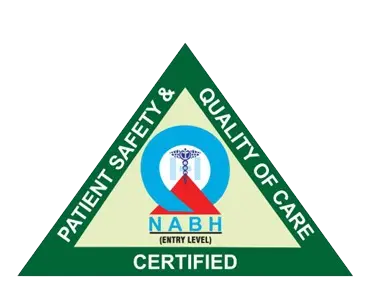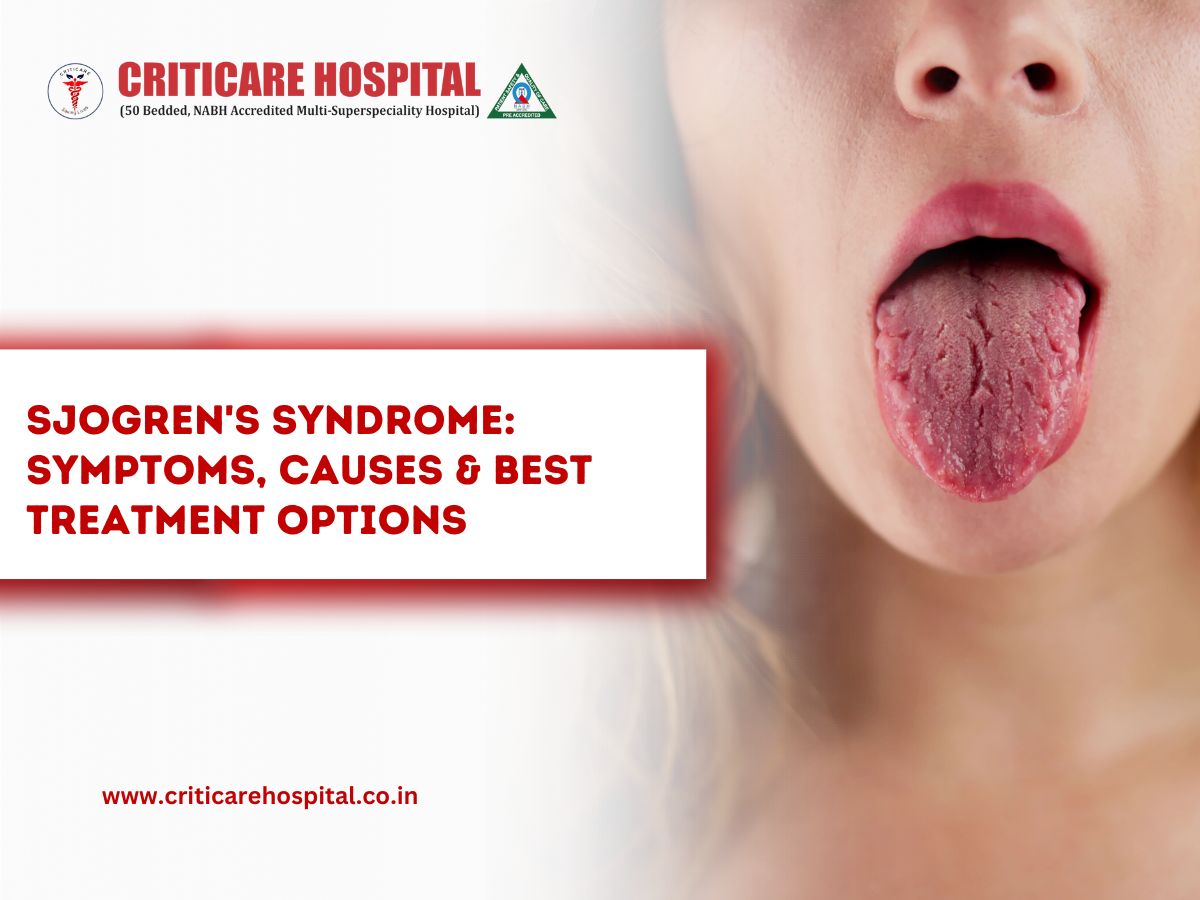Health conditions sometimes conceal themselves using the most basic of symptoms. However, when your eyes feel strangely dry or you feel like your mouth is continually parched despite quenching your thirst, this may not appear to be too much of a burden. In other individuals, they may point to a form of early indicators of an autoimmune disease known as the Sjogren Syndrome.
At CritiCare Hospital, we frequently encounter patients who have been living, months and years away and only to understand that something was amiss. This is done because through this blog you will know what Sjogren Syndrome is, what causes it, the way it affects your body and what treatment methods can help to relieve and provide you with comfort in your daily life.
What is Sjögren’s Syndrome?
Sjogren Syndrome (also known as SHOW-grens) is a chronic inflammatory disease. In general, your immune system defends your organism against infections. However, in the Syndrome of Sjögren, it begins to attack your own glands that produce water, that is to say, your salivary and tear glands (the salivary gland produces saliva, and the tear gland produces tears). Consequently, the most prominent symptoms that potentially appear in an individual with this condition include dry mouth and eyes.
This condition is divided into two major forms. Primary Sjogren syndrome is a disease on its own, but secondary Sjogren syndrome is contracted consequent to other autoimmune diseases such as rheumatoid arthritis or lupus. Women aged above 40 tend to be the most common carriers of the condition, though anyone, such as men and the younger generation, can be an eye dropper of the condition.
What Are the Causes of Sjogren Syndrome?
It is not very clear how exactly the Sjorn syndrome occurs, yet the medical community believes that it is a result of interaction between genetic factors, surroundings and hormones. Other individuals are born to affect them so as to have autoimmune issues because of inherited genes. Their immune system may initiate an attack on their own tissues, particularly their glands that produce moisture when they are exposed to be attacked by certain triggers such as viruses, bacteria, and so on.
Hormones also play a part. Women are far more exposed to the disease, particularly in the postmenopausal period. The glands have a greater exposure to immune attacks due to lower estrogen. Persistence in stress, the long-term infection may also provoke or exacerbate the condition, wherever genetic predisposition predominates.
Identifying the Signs of Sjogren Syndrome
The symptoms of Sjogren’s Syndrome may vary considerably with individual. The dryness is not too harmful to some people, but to some, it may be uncomfortable or result in disorders of various body cells.
A very common sign is dry eyes. It has been said by many to be a burning, gritty, or itchy feeling like sand in the eyes. This complicates the process of wearing near-sighted eye contactors or reading newspapers, TV or computer extended operating hours. Vision could be slightly blurred, particularly at the end of the day.
The other significant symptom is dry mouth. It is usually sticky or rough, thereby complicating the process of swallowing and speaking. Saliva serves as a protective factor of the mouth and teeth, and hence, the shortage of saliva may result in the development of cavities, gum disease and mouth lesions. Changes in taste or difficulty in eating dry foods are some of the changes to be noticed by people.
Fatigue is a big symptom. Notwithstanding sleep, patients with Sjogren remain significantly weary or unenergetic. This fatigue is not limited to the physical dimension only, and it may also spill organization to the mood and the level of productivity.
Several patients complain of joint pains and stiffness, such as mild arthritis, as well. The swelling and soreness of the salivary glands, especially around the jaw or ear, is also a possibility. Sjogren’s may also leave some internal body parts such as lungs, kidneys, or nerves; however, this is much less frequent and normally appears in later stages.
The Diagnosis of Sjögren Syndrome
Sjogren Syndrome is a difficult condition to detect, since its symptoms are similar to other conditions, with quite a number of individuals being affected by reasons other than thirst. In CritiCare Hospital, our experts take a thorough history of the disease, a physical examination, and diagnostic analyses in order to accurately diagnose the patient.
The initial procedure is usually blood tests, since they can detect certain antibodies associated with Sjogren Syndrome, SSA/Ro and SSB/LA. A third test is known as the Schirmer Test, which determines the amount of tears by using small pieces of paper beneath the eyelids. A saliva flow test can also be preconducted to determine the quantity of saliva that the glands generate over a given period of time.
In other instances, the diagnosis is determined by carrying out a salivary gland biopsy. It involves a minor biopsy of the tissue of the lip, under microscopic scrutiny to identify inflammation. The tests, coupled with your symptoms and medical history, enable our specialists to make a clear diagnosis and develop a treatment plan that fits well in your case.
Effective treatment of Sjögren syndrome
Sjogren syndrome is currently not incurable, but can be managed. It aims at treating to relieve the symptoms, ensure that the other body organs are safeguarded, and enrich the quality of their life. We consider the entire patient at CritiCare Hospital. Our treatment of the sickness, assistance in local aspects and comfort.
In the case of individuals with dry eyes, the medics tend to recommend artificial tear gas or lubricating eye drops. These are used to keep the eyes wet and prevent irritation. During the night, a heavy gel or ointment may help relieve the dryness. Then the punctal plugs in small sizes can be employed to stop the flow of tears so that natural moisture can remain on the eyes. Uncomfort can also be reduced by avoiding dust and dry conditions in the house and putting wet air coolers at home.
In case of dry mouth, the aim here is to make the mouth moist. Patients need to drink a lot of water throughout the day and not excessive drinks that can worsen the dryness, like coffee and alcoholic drinks. Sugar-free gum or lozenges can be coveted, as chewing the gum can help increase saliva. Saliva replacement is also in in the form of sprays or gels to alleviate pain. Oral Hygiene is of great importance since oral health is a greater challenge to the sufferers of Sjogren e.g. individuals can easily develop oral issues.
Mild painkillers and anti-inflammatory drugs can be used to treat mild cases of joint pain or inflammation. In case the immune system targets other organs, more powerful medication, including corticosteroids, immunosuppressants, may be required to lower immune responses. The medicinal strategy of every belief is individual, depending on the severity of symptoms and the involved organs.
In the CritiCare Hospital, we underline the importance of healthy habits as a component of treatment. Exercising on a regular basis, eating healthily, drinking enough water, and sleeping are very beneficial to your energy and overall mood.
When to see a doctor
When you are suffering from historically stubborn eye and mouth dryness, unexplained fatigue, or aching in your joints which keeps coming despite drugs, it is time to seek medical assistance. Early diagnosis of Sjogren’s Syndrome can go a long way, as it allowed me to prevent the complications and feel comfortable.
Our team combines contemporary tests and a human attitude to enable you to know your status and locate the most appropriate treatment. The earlier you do what you can to cure the symptoms, the less difficult they are to treat.
Final thoughts
Sjogren’s Syndrome is a chronic disease, although it does not necessarily rule your life. Through correct care and early diagnosis, and good habits, you will still have a healthy life of stability, ease, and assurance.
In CritiCare Hospital Lucknow, our concept is one-on-one, permanent comfort, and educating patients. We are available in case you or one of those close to you experiences abnormal dryness or weakness. Schedule an appointment with our specialists today and make the first step towards knowing and coping with Sjögren’s Syndrome as well as overcoming the syndrome with the care and experience that you deserve.




